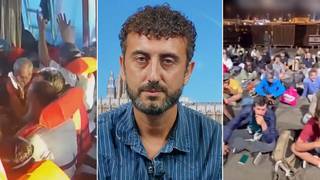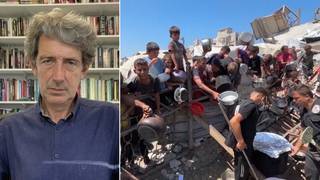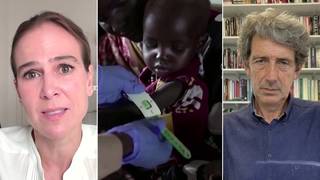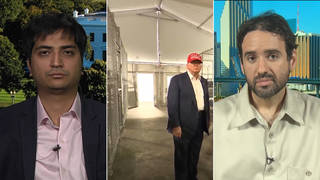
Guests
- Daniel Kammenscience envoy for the State Department and professor of energy at University of California at Berkeley.
The United Nations has announced that 2016 is very likely to be the hottest year on record, surpassing 2015, which had been the warmest year since records began. Meanwhile, Reuters reports President-elect Donald Trump is seeking quick ways to withdraw the United States from the Paris Accord to combat climate change. Trump is a longtime climate change denier who has described global warming as a Chinese hoax. To talk more about the U.N. climate talks here in Marrakech and the significance Donald Trump’s election for the world’s effort to combat climate change, we are joined by Daniel Kammen, science envoy for the State Department and professor of energy at University of California at Berkeley.
Transcript
AMY GOODMAN: We’re broadcasting from Marrakech, Morocco, here at the U.N. climate summit, or COP 22, the conference of the parties. The high-level talks began earlier this morning. The United Nations has announced that 2016 is very likely to be the hottest year on record, surpassing 2015, which had been the warmest year since records began. World Meteorological Organization Secretary-General Petteri Taalas spoke here in Marrakech, Morocco, on Monday.
SECRETARY-GENERAL PETTERI TAALAS: On instrumental records so far, and if you look at the first—first nine months of this year, we are fairly high up again, and we are breaking all the records. And it’s likely that we will—we are going to reach this year 1.2-degree warming level, and we are going the wrong direction, if you think of this 1.5-degree warming level, which was agreed last year in Paris.
AMY GOODMAN: Meanwhile, Reuters is reporting Donald Trump is seeking ways to quickly withdraw the United States from the Paris Accord to combat climate change. Trump is a longtime climate change denier, who has described global warming as a Chinese hoax. On Monday, the U.S. special envoy on climate change, Jonathan Pershing, revealed that no one from Trump’s transition team has reached out to him to discuss U.S. climate policy.
JONATHAN PERSHING: I don’t really have any good insight for you. We are not yet in touch with the transition team. As I noted, they have not yet been named for our agency. We’re waiting to talk with them. I anticipate that will happen soon after I return to Washington. But in the absence of that, we don’t have any information to offer about our expectations for them. They haven’t been in touch with us.
AMY GOODMAN: To talk more about the U.N. climate talks here in Marrakech, Morocco, and the significance of Donald Trump’s election on the world’s effort to combat climate change, we’re joined by two guests. Daniel Kammen is science envoy for the U.S. State Department, professor of energy at the University of California at Berkeley. And Asad Rehman rejoins us today, spokesperson for Friends of the Earth International. He’s based in Britain.
We welcome you both to Democracy Now! Daniel Kammen, let’s begin with you. You’re the science envoy here of the State Department. John Kerry is expected to arrive in a couple of hours here at the U.N. summit. There are a number of world leaders here. The king of Morocco just passed behind us. A new leader has been chosen in the United States—not by popular vote. Still, Hillary Clinton, I believe, has around 2 million votes more, and that votes are still being tallied.
DANIEL KAMMEN: That’s right.
AMY GOODMAN: But when it comes to the Electoral College, it looks like Donald Trump will be the next president. Your response as the climate envoy—the science envoy for the State Department?
DANIEL KAMMEN: Well, sticking to the climate story, I’d like to think that any new head of state, from whatever ideological background, will recognize that the science of climate change is really undisputable. I’ve been a member of the IPCC, the group that does the research to inform the U.N., for 15 years. And the hottest year records fall year after year. The economics of clean energy are overwhelmingly positive in terms of the low prices of solar and wind, the ability to meet both large-scale energy systems in the U.S. and China, but also off-grid options, and to really show that clean energy is actually a populist tool to bring resources to people who need it. So, I’d like to think that message will make it through, but we’ll see what happens as the politics plays out in D.C.
AMY GOODMAN: So, what does it mean for this summit? Donald Trump has been very clear: One of his first acts would be to pull out of the Paris climate agreement.
DANIEL KAMMEN: Well, thankfully for this summit in Morocco, we’re still under the current Obama administration, where the U.S. is playing a strong role to highlight goals for 2030 in the United States through the Clean Power Plan, but, most importantly, to be a partner overseas and around the world with governments like Morocco and Kenya that want to develop clean energy plans. You’re asking about what will happen at the next COP, and opinions vary widely. Pulling out of the COP legally is a process that would take some time, because not only was it signed and ratified under a month ago, but there is a process to pull out that takes a few years. The challenge is that you can be a passive-aggressive obstructionist by not sending a delegation, by not coming through with U.S. obligations. And to my mind, that would really be turning your back on economic winning opportunities.
AMY GOODMAN: Now, just to be clear, it would take what? Three years and then another year, which would be four years, which is the term of a president, if he wanted to pull out?
DANIEL KAMMEN: That’s true, but that’s for the legal process to remove the U.S. as an official member. There’s lots of steps along the way that are important. We’ve seen that the thing that arguably made Paris a success last year was a non-COP event. It was the APEC summit in 2014, when President Obama and Premier Xi signed a G2 of climate agreement, if you will, a bipartisan plan to limit emissions and to lead the world in this area. That led the way to Paris. And so, there are very important actions that could be taken that could slow things down.
AMY GOODMAN: Can you explain—when President Obama talks about a peaceful transition, I think many people just mean—you know, that he’s saying people won’t take up guns in opposition, something like that. But actually, it has a very specific meaning. What I am certainly coming to learn here in Morocco from many people around the world, especially people in the United States, that he will not introduce anything new in this lame-duck kind of period, which means—wasn’t the U.S. here supposed to introduce the decarbonization plan of 2050, and now this is just not being introduced?
DANIEL KAMMEN: No, I don’t think that’s quite right, because the U.S. has highlighted a number of commitments that it made in the past months. There’s a number of significant tranches of funding—$500 million here, another $750 million coming. Those things are going to happen during the next days. But what you’re talking about, I think, is the really important effort, because what we’ve learned in the climate process is that your 2020 goals and 2030 goals must be enabling of 2050. They can’t be goals unto themself. And the challenge is that right now the U.S. has a well-thought-through plan. If you don’t follow through on the elements of that, then you do put the larger process of decarbonizing at home and being an enabler and assister around the world in jeopardy.
AMY GOODMAN: I’ve also heard that the Department of Energy had a significant delegation that was coming here, and it was cut by a number of people. Why would the Obama administration not double down as opposed to just start to give in to the new administration?
DANIEL KAMMEN: Yeah, so I haven’t heard the details of that. I know the State Department team will be significant. I’ve met a number of colleagues from Department of Energy—assistant secretaries, deputy secretaries—who are here very much supporting this clean energy domestic and abroad plan. But transitions are often uncertain. And the idea that you can be peaceful militarily, but not necessarily cooperative, is certainly one of the areas where we worry, because diplomacy is not an overnight process. It requires building trust. And that’s one of the things that we’ll have to see what plays out.
AMY GOODMAN: Do you think if Bernie Sanders was the candidate, he would have won this election against Donald Trump?
DANIEL KAMMEN: I do. I don’t think that’s really that ambiguous. When you look at the poll numbers that were head-to-head Trump and Sanders, they were very clearly 10, 15 points for Senator Sanders. And the second feature is that we now know, in retrospect—we didn’t necessarily know at the time—but that many of the things that propelled Mr. Trump were a backlash, an anger and a appeal to undereducated Americans. And Mr. Sanders has spoken eloquently to the needs of lower-income Americans in ways that most candidates for president—Secretary Clinton—have not. And I do think he would have been a powerful candidate in this race. But it’s all speculation in hindsight now.
AMY GOODMAN: Well, let’s go to former presidential candidate Bernie Sanders speaking on Face the Nation about Donald Trump’s climate policy.
SEN. BERNIE SANDERS: What astounds me—and I hope this changes very quickly—is we now have a president-elect who actually does not believe that climate change is real. I worry very much what this means for our kids and our grandchildren and the future of this planet. And millions of people are going to have to tell him, “Mr. Trump, you are dead wrong.”
AMY GOODMAN: Bernie Sanders. Response to that, Daniel Kammen?
DANIEL KAMMEN: And I think he’s right on the money. To be a climate denier in 2016 is to simply ignore science. A businessman is supposed to be flexible and thoughtful about opportunity. Clean energy is an economic boon, and it’s a boon for equity around the planet. And to turn your back on that is to put ideology over simple, good clean energy business and clean energy jobs.












Media Options